V-class ferry
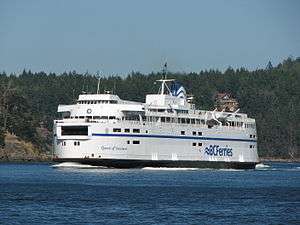 | |
| Class overview | |
|---|---|
| Name: | V class (Victoria class) |
| Builders: | Vancouver, BC & Victoria, BC |
| Operators: | BC Ferries |
| Preceded by: | Sidney class |
| Succeeded by: | |
| Subclasses: | |
| Built: | 1962–1963 |
| In service: | 1962–2008 |
| Planned: | 7 |
| Completed: | 7 |
| Active: | 1 |
| Retired: | 6 |
The V-class ferries, also known as Victoria class, originally included seven BC Ferries built between 1962 and 1963. These vessels were the backbone of service on the Tsawwassen – Swartz Bay route prior to the arrival of MV Spirit of British Columbia in 1993. Some of these vessels underwent vehicle capacity increases three times.
The vessels began to be retired in 2000. Four vessels were slated to be retired and sold in 2008.[1] The transfer of the Queen of Esquimalt was halted and she was broken up in Ensenada, Mexico.[2] The Queen of Nanaimo was retired in 2017.[3]
History and sub-classes

%2C_stretched_(c)%2C_lifted_(r)_(D.O._Thorne_original_artwork_drawn_1981_%C2%A9).jpg)
A total of seven Victoria-class ferries were constructed.
- Original seven V-class vessels:
- MV Queen of Victoria
- MV Queen of Vancouver
- MV Queen of Saanich
- MV Queen of Esquimalt
- MV Queen of New Westminster
- MV Queen of Nanaimo
- MV Queen of Burnaby
The seven ships were modified twice in quick succession to increase vehicle capacity. The first refit was the installation of ramps and platform car decks and the second saw the ships sliced in half vertically across the beam for the insertion of a new 84-foot (25.6 m) midsection, which dramatically increased their capacity.
Later, four of the seven ships were cut horizontally from bow to stern to have a new vehicle deck inserted. These rebuilt ships retained the V-class designation. Queen of Burnaby and Queen of Nanaimo were two original ships without the new car deck; they received a new designation as Burnaby-class vessels. The Queen of Burnaby retired in May 2017 (replaced by the MV Salish Orca) and the Queen of Nanaimo was retired in September 2017 (replaced by the MV Salish Eagle).
The last of the seven ships, Queen of New Westminster, was lifted in 1991 and was fit with new engines to travel at speeds comparable to the newer C-class ferries. Queen of New Westminster was also dropped from the V-class designation, and is now officially unclassed. She had a major refit of her passenger areas completed in 2009, preparing her for another ten to fifteen years of service, and will be the sole survivor of the original seven ships.
- Designations of original seven V-class vessels:
- V class (with ramps, stretch, and raise)
- MV Queen of Victoria (scrapped)
- MV Queen of Vancouver (scrapped)
- MV Queen of Saanich (scrapped)
- MV Queen of Esquimalt (scrapped)
- Burnaby class (with ramps and stretch)
- MV Queen of Nanaimo
- MV Queen of Burnaby
- Unclassed (with ramps removed, stretch, raise, and larger engines)
- MV Queen of New Westminster
- V class (with ramps, stretch, and raise)
Former V-class vessels
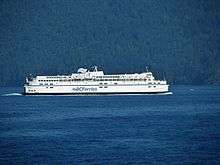
Queen of Vancouver (scrapped)
Former MV City of Vancouver
Built: Vancouver, British Columbia, 1962
Retired: April 15, 2009 – Sold to Coast Marine, moored at Woodfibre until 2012, sent for scrapping to Ensenada, Mexico[4]
Length: 129.9 m (426 ft)
Power: 9,000 hp (6.7 MW)
Propulsion: Two MaK 9MU551AK
Service speed: 18.5 knots (34 km/h)
Gross tons: 9,357.22
Car capacity: 338
Passenger & crew capacity: 1,708
Route: Tsawwassen – Swartz Bay
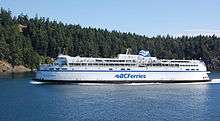
Queen of Saanich (scrapped)
Built: Victoria, British Columbia, 1963
Retired: November 18, 2008 – Sold. Renamed Owen Belle. Used as a logging camp on the coast of the Vancouver Island. Later moved to be moored on west side of Anvil Island in Howe Sound. Scrapped in 2012 at Ensenada, Mexico.[5][6]
Length: 129.9 m (426 ft)
Power: 8,941 hp (6.7 MW)
Propulsion: Two MaK 8M551AK
Service speed: 18.5 knots (34 km/h)
Gross tons: 9,301.65
Car capacity: 360
Passenger & crew capacity: 1,708
Route: Swartz Bay – Tsawwassen
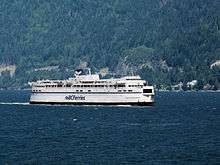
Queen of Esquimalt (scrapped)
Built: Victoria, British Columbia, 1963
Retired: May 25, 2008 – Sold to Dalian Golden Sun I/E Co., Ltd. Docked in Port Alberni and renamed Princess Jacqueline. In 2011 the vessel was scrapped in Ensenada, Mexico.[4]
Length: 129.9 m (426 ft)
Power: 8,500 hp (6.3 MW)
Propulsion: Two MaK 8M551AK
Service speed: 19 knots (35 km/h)
Gross tons: 9,304
Car capacity: 376
Passenger & crew capacity: 1,656
Route: Langdale – Horseshoe Bay (summer), spare ship in all other seasons.
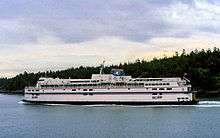
Queen of Victoria (scrapped)
Former MV City of Victoria
Built: Victoria, British Columbia, 1962
Retired: 2001 – sold to R & G Importadora & Exportadora of the Dominican Republic. Renamed Queen of Ocoa. Scrapped in 2006 at Alang, India.[1]
Length: 129.9 m (426 ft)
Power: 9,000 hp (6.7 MW)
Propulsion: Two MaK 9MU551AK
Service speed: 19 knots (35 km/h)
Gross tons: 9,294
Car capacity: 286
Passenger & crew capacity: 1,360
Route: Tsawwassen – Swartz Bay
| Preceded by Sidney class |
BC Ferries flagship 1962–1985 |
Succeeded by MV Queen of the North |
References
- 1 2 Aging Queen of Esquimalt ferry sold to buyer in China
- ↑
- ↑ Queen of Nanaimo becomes third BC Ferries ship given new life in Fiji. Vancouver Sun, 2017-11-22. Retrieved 2018-04-06
- 1 2 http://www.comoxvalleyrecord.com/news/163950086.html
- ↑ Retired ferry towed to Mexico – Coast Reporter, September 29th 2012
- ↑ Success! Queen of Sannich to be Scrapped – The Future of Howe Sound Society